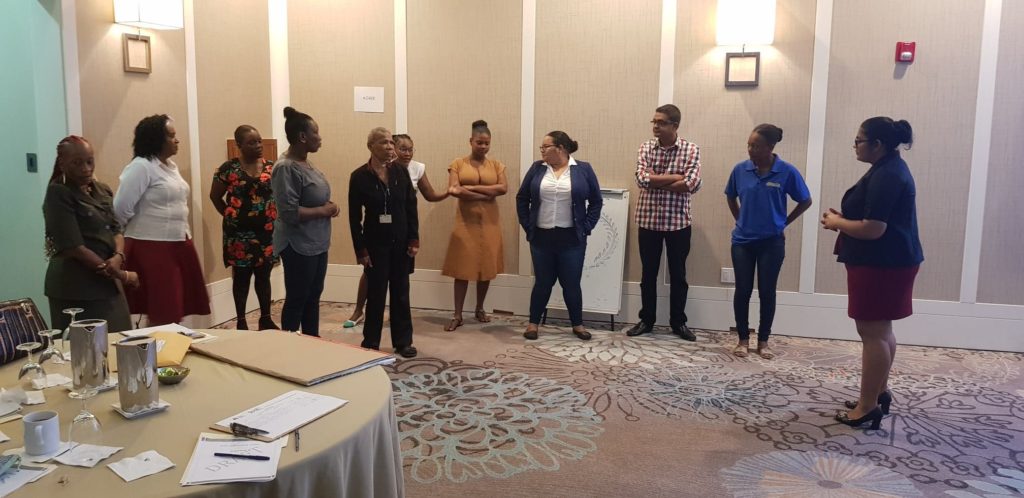
Advancing HIV Prevention and Treatment in Guyana through Advocacy
Image: Guyanese civil society participants in a practical exercise facilitated by SASOD Guyana’s Human Rights Coordinator Sarah Bovell (right) at the Caribbean Vulnerable Communities Coalition (CVC) Advocacy Planning Validation Meeting
While Guyana adopted a “Treat All” strategy in 2018, further advocacy is needed for Guyana to reach its 95-95-95 targets for HIV testing, treatment and viral suppression. Stemming from this, organizations providing support to vulnerable groups in Guyana met during 2017 and 2018 to discuss HIV-related advocacy needs.
These meetings resulted in an initial set of priority HIV advocacy strategies, and activities were developed to formulate an Advocacy Plan. The CVC then provided funding for advocacy activities included in the plan through the CVC/COIN Caribbean Civil Society project titled “Challenging Stigma and Discrimination to Improve Access to and Quality of HIV Services in the Caribbean.”
On July 18, 2019, Guyana’s Society Against Sexual Orientation Discrimination (SASOD Guyana) facilitated an Advocacy Planning Validation Meeting at the Guyana Marriott Hotel in Georgetown on behalf of CVC to engage key stakeholders in identifying suitable, short-term advocacy campaigns and also to revise the Advocacy Implementation Matrix for the period October 2019 to September 2022. Fifteen persons representing 14 civil society organisations participated in the meeting.
They proposed suggestions for amending of the Implementation Matrix and selected a managing partner to coordinate the implementation of the Advocacy Plan in collaboration with the various partners. The meeting also identified two ranked priority activities.
At the meeting, challenges in reaching persons most-at-risk with testing and prevention of HIV were discussed. These include stigma and discrimination against key populations which prevent them from coming forward to be tested and treated and lack of confidentiality at treatment sites coupled with high turnover among healthcare staff due to low salaries. These include staff who received HIV–related training resulting in clients having to rebuild trust and rapport with new healthcare staff, which takes time and can result in patient discomfort. Insufficient funding from government and the absence of Pre-Exposure Prophylaxis (PrEP) were also identified as major gaps and challenges.
Thoughtful advocacy is needed for high-quality HIV-related healthcare in Guyana in order to monitor the patient experience of health services. This scope would encompass the documentation of instances of stockouts, stigma and discrimination, breaches of confidentiality, and lack of appropriate, competent services and referrals. In addition, the Advocacy Plan recommends conducting an analysis of these situations and providing the Ministry of Public Health with clear recommendations for improvements.
The meeting also discussed the need for ongoing training of healthcare staff to prevent stigma, discrimination and judgmental attitudes. In addition, there should be enforceable measures to ensure that staff preserve the confidentiality of patient information. Further to this, there should be incentives provided to persons who access prevention and treatment services. The meeting called for government support in providing case navigators to aid retention in care and a strategy to collect data on migrant populations since there is limited data about their HIV vulnerabilities.
